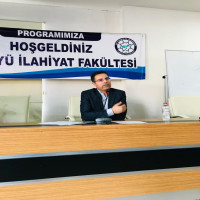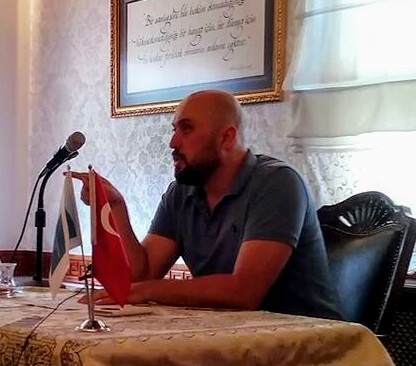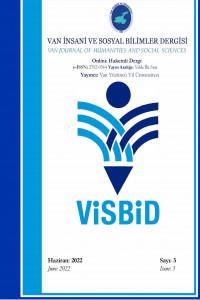Research Article
Aim & Scope
Van Journal of Humanities and Social Sciences (ViSBiD), published electronically, is an academic and peer-reviewed journal that includes original scientific research papers in the fields of humanities and social sciences.
Academic and ethical values are seen as the main purpose in the functioning of the journal, and a transparent, independent and objective process is adopted as a principle.
Articles with good scientific quality, contributing to the field, presenting academic knowledge with current problems, new approaches and theoretical background are first published after the evaluation of the Editorial Board and then the relevant referees.
ViSBiD accepts articles written in Turkish and English.
Author Guidelines
Ethical Principles and Publication Policy
Authors submitting their work to Van Journal of Humanities and Social Sciences -ViSBiD are required to meet the following ethical principles.
1. It is expected that the articles sent to the Van Journal of Humanities and Social Sciences are original and free of plagiarism. Before the article is sent to the journal, a plagiarism report should be obtained by the author using software from utilities (such as IThenticate, Turnitin). The article should be sent to the journal together with this report. The articles are evaluated together with these reports by the Editorial Board. Articles with a similarity rate of 20% or more will not be evaluated. Due to the high similarity rate, the article is rejected by the editorial board. If a published article is later proven to be within the context of plagiarism, it will be removed from the website and the articles that the related author(s) will send to the journal for five years will not be evaluated.
2. The similarity reports of the articles decided to be sent to the referees by the Editorial Board are also sent to the referees and the referees are expected to consider this issue.
3. In case of papers presented orally at the symposia but not published in the book, and publications from theses, this should be clearly stated with a footnote. Works published in different languages should not be translated into Turkish and sent to the journal to be reprinted.
4. When plagiarism is detected in the studies, the editor of the journal has the authority to take the necessary sanctions. Studies may be rejected for this reason. In case of suspicion of plagiarism about a published article, Van Humanitarian and Social Sciences Journal will remove the article from its web access page and initiate the necessary investigation and notify the relevant institutions and authorities and the directories that scan the journal.
5. Persons who appear as authors in articles with more than one author must have made a significant contribution to the study. "Gift writing" given to non-contributors and "ghost writing" that does not include the names of contributors cannot be accepted.
Acceptance of publications produced from theses and projects is subject to the consent of the advisor or the director, and waiver when necessary.
6. It is essential to declare the institutions that contributed financially and supported the study in the acknowledgment section.
7. Van Journal of Humanities and Social Sciences requires the permission document for studies that require ethical approval, and gives the institution where the approval was obtained, the date and issue number of the document in the article. It should be stated in the candidate article that ethics committee approval has been obtained for studies that require data collection from the participants, such as questionnaires, scales, interviews, observations, audio and video recordings, and which are based on field research. Evidence of sensitivity to ethical issues during the data collection process should be presented in the study.
8. Authors are expected to submit their previously unpublished work to the journal. It is unacceptable for a submitted work to be simultaneously submitted to another journal.
9. It is not acceptable to send the results of a research in slices in more than one publication format.
10. Authors are obliged to submit the raw data of their research when requested by the editor and referees and keep them after their articles are published.
11. When an author detects a material error or inaccuracy in his article published in ViSBiD, he must immediately notify the journal editor and cooperate with the editor to retract or correct the article.
Price Policy
ViSBiD does not charge any fees for published articles.
Indexes
Journal Boards
Chief editor

Assistant Editors


Editorial Bord


I studied archaeology at Aegean University, and my master's thesis was on the cuneiform language of Urartian. I completed PhD in the Department of Linguistics at Ankara University with a thesis on Turkish-Kurdish language contact. I took part on an EU project, Approaches to Multilingual Schools in Europe (AMuSE) led by Prof. Dr. Jochen Rehbein. I currently work at Van Yuzuncu Yil University as an associate professor and do studies on Urartian texts, endangered languages, and language contact.
Erkan Yılmaz, 2000 yılında Ankara Üniversitesi, DTCF Coğrafya bölümünde eğitime başlamış, 2004 yılında mezun olmuştur. 2004 yılında aynı bölümde yüksek lisans eğitiminde başlayan Yılmaz, 2006 yılında, “Çamlıdere Barajı Havzasında Erozyon Problemi” adlı yüksek lisans tezi ile mezun olmuştur. 2007 yılında, doktora eğitimine başlamış, 2013 yılında, “Ankara Şehrinde Şehir Isı Adası Oluşumu” teziyle doktor ünvanı almıştır. Yılmaz, 2014 yılında yardımcı doçent kadrosuna atanış, 2020 yılında doçent olmuştur. Halen, fiziki coğrafya, iklim değişikliği, şehir iklimi, paleoiklim konularında çalışmaktadır.


Ayhan Kaya is Professor of Politics and Jean Monnet Chair of European Politics of Interculturalism at the Department of International Relations, Istanbul Bilgi University; Director of the Jean Monnet Centre of Excellence; and a member of the Science Academy, Turkey. He is currently European Research Council Advanced Grant holder (ERC AdG, 2019-2024). He received his PhD and MA degrees at the University of Warwick, England. Kaya was previously a Jean Monnet Fellow at the European University Institute, Robert Schuman Centre for Advanced Studies, Florence, Italy, and adjunct lecturer at the New York University, Florence in 2016-2017. He previously worked and taught at the European University Viadrina as Aziz Nesin Chair in 2013, and at Malmö University, Sweden as the Willy Brandt Chair in 2011. He is specialised on European identities, Euro-Turks in Germany, France, Belgium and the Netherlands, Circassian diaspora in Turkey, the construction and articulation of modern transnational identities, refugee studies in Turkey, conventional and nonconventional forms of political participation in Turkey, and the rise of populist movements in the EU. His recent manuscripts are Syrian Refugees in Turkey: Between Reception and Integration (Switzerland: Springer IMISCOE, 2023, co-authored with Z. Şahin-Mencütek, E. Gökalp-Aras, and S. B. Rottmann), and Populism and Heritage in Europe. Lost in Diversity and Unity (London: Routledge, 2019). His recent edited volumes are Nativist and Islamist Radicalism: Anger and Anxiety (London: Routledge, 2023, with Aysenur Benevento and Metin Koca); Memory in European Populism (London: Routledge, 2019, with Chiara de Cesari). Some of his books are Turkish Origin Migrants and their Descendants: Hyphenated Identities in Transnational Space (Palgrave, 2018), Europeanization and Tolerance in Turkey (London: Palgrave, 2013); Islam, Migration and Integration: The Age of Securitization (London: Palgrave, 2012); Contemporary Migrations in Turkey: Integration or Return (Istanbul Bilgi University Press, 2015, in Turkish, co-edited with Murat Erdoğan), Belgian-Turks, Brussels: King Baudouin Foundation, 2008, co-written with Ferhat Kentel), Euro-Turks: A Bridge or a Breach between Turkey and the EU (Brussels: CEPS Publications, 2005, co-written with Ferhat Kentel, Turkish version by Bilgi University); wrote another book titled Sicher in Kreuzberg: Constructing Diasporas, published in two languages, English (Bielefeld: Transkript verlag, 2001) and Turkish (Istanbul: Büke Yayınları, 2000). He also translated Ethnic Groups and Boundaries by Fredrik Barth and Citizenship and Social Classes by T. H. Marshall and Tom Bottomore to Turkish language. He also edited several books on migration, integration, citizenship, and diasporas. Kaya’s publications have been translated to several languages such as French, German, Japanese, Italian, Arabic and Dutch. Kaya was actively involved in two FP7 and three Horizon 2020 projects, and now he is involved in two different Horizon 2020 research projects on migration. Kaya received Turkish Social Science Association Prize in 2003; Turkish Academy of Sciences (TÜBA-GEBİP) Prize in 2005; Sedat Simavi Research Prize in 2005; Euroactiv-Turkey European Prize in 2008, the Prize for the best Text Book given by TÜBA; and also the Prize for excellence in teaching at the Department of International Relations, Istanbul Bilgi University in 2013 and 2017.





Siyaset bilimci ve göç araştırmacısı olan Prof. Dr. M. Murat ERDOĞAN, Uluslararası Metropolis Danişma Kurulu Üyesi, UNESCO-Türkiye İletişim Komitesi üyesi ve İltica ve Göç Araştırmaları Merkezi’ne bağlı IGAM-ACADEMY Başkanıdır.
Prof. Erdoğan, 1987-2017 yılları arasında Hacettepe Üniversitesinde çalışmış, 2009 yılında Hacettepe Üniversitesi Göç ve Siyaset Araştırmaları Merkezini (HUGO) kurmuş ve 2017’ye kadar müdürlüğünü yapmıştır. 2017-2022 yıllarında Türk-Alman Üniversitesi’inde görev yapan ve burada Siyaset Bilimi ve Uluslararası İlişkiler Bölüm Başkanlığı ve kurucusu olduğu Göç ve Uyum Araştırmaları Merkezi (TAGU) Müdürlüğünü yapan Erdoğan; Mart 2022-Ekim 2024 arasında Ankara Üniversitesi Siyasal Bilgiler Fakültesi Mülkiye Göç Araştırmaları Merkezi’nin kurucu müdürü olarak görev yaptı. Akademik ilgi alanları iradi ve zorunlu göçler, mülteciler, yurtdışındaki Türkiye kökenliler, AB, siyasal karikatürler, siyasal davranışlar, İslamafobi, Almanya ve Türk dış politikası olan Prof.Erdoğan, Avrupa’daki Türk diasporası konusunda “Euro-Turks-Barometre”, Türkiye’deki Suriyeliler konusunda ise “Suriyeliler Barometresi” başlıklı kamsamlı ve düzenli kamuoyu araştırmalarını da yürütmektedir.
Language Editors


Spelling Editor

Layout Editors


Section Editors

Vefa Taşdelen: 1966 yılında İnebolu’da doğdu. İlk ve orta öğrenimini burada tamamladı. 1989 yılında İstanbul Üniversitesi Edebiyat Fakültesi Felsefe Bölümü’nden mezun oldu. Aynı bölümde Varoluşçuluk ve Edebiyat Etkileşimi başlıklı yüksek lisans tezini hazırladı. Van’ın Gürpınar ilçesinde iki yıl öğretmenlik yaptıktan sonra 1994 yılında Yüzüncü Yıl Üniversitesi Eğitim Fakültesine araştırma görevlisi olarak girdi. 1997-2000 yıları arasında, Seyir Estetik ve Sanat Dergisi’ni yönetti. 2000 yılında Ankara Üniversitesi Eğitim Bilimleri Enstitüsü’nde araştırma görevlisi oldu. 2004’te Søren Kierkegaard’un Varoluş Alanlarında Benliğin Oluşamaması Sorunu ve Bir Çözüm Önerisi Olarak Sevgi Alanı, 2006’da Eğitim Hermeneutiği Sorunsalı Üzerine Felsefi Bir Araştırma başlıklı doktora tezlerini savundu. 2007’de Yüzüncü Yıl Üniversitesi Fen-Edebiyat Fakültesi Felsefe Bölümü’ne öğretim üyesi olarak girdi. 2012 yılında Yıldız Teknik Üniversitesi Eğitim Fakültesi Eğitim Bilimleri Bölümü’ne geçiş yaptı. Çeşitli dergilerde felsefe, eğitim, sanat, edebiyat konularında yayımlanmış makale ve denemeleri bulunan Taşdelen 2017-2020 yılları arasında Kırgızistan-Türkiye Manas Üniversitesi Edebiyat Fakültesi Felsefe Bölümü’nde geçici görevle çalıştı. Halen Yıldız Teknik Üniversitesi Eğitim Fakültesinde görev yapmaktadır.
Eserleri: Sanat Akımları Sorunsalı ve Sürrealizm (inceleme, Girişim Yayınları, 1996) Kaygı Kavramı (Søren Kierkegaard’dan çeviri-inceleme, Hece Yayınları, 2004), Kierkegaard’da Benlik ve Varoluş (inceleme, Hece Yayınları, 2004), Felsefe Eğitim Sanat: Saffet Bilhan Armağanı (derleme, Sabri Büyükdüvenci’yle birlikte, Hece Yayınları, 2006), Hermeneutiğin Evrimi, Kesitler (inceleme, Hece Yayınları, 2008), Eğitimden Felsefeye: Necmettin Tozlu Armağanı (derleme, Ahmet Yayla ve Alaattin Karaca’yla birlikte, Yüzüncü Yıl Üniversitesi Yayınları, 2011), Felsefeden Edebiyata, (deneme-inceleme, Hece Yayınları, 2013), Çağın Sorunları Karşısında Eğitim (derleme, Necmettin Tozlu ve Mehmet Önal’la birlikte, Bayburt Üniversitesi Yayınları, 2014), Felsefe Kültürü (Hece Yayınları, 2015), Felsefe ve Edebiyat Sempozyumu Bildiri Metinleri (derleme, Z. Taştan, A. Eyim, M. Erzen, E. Rızvanoğlu ile birlikte, Yüzüncü Yıl Üniversitesi Yayınları), Dünyada ve Türkiye’de Üniversite (derleme, Necmettin Tozlu ve Mehmet Önal’la birlikte, Bayburt Üniversitesi Yayınları, 2016). Kaygıdan Umuda Varoluşun Renkleri (inceleme, Hece Yayınları, 2017). Önsözler (Søren Kierkegaard’dan çeviri, Ralph Lebro’yla birlikte, Beyaz Gemi Yayınları, 2022),






Scientific Advisory Board

Ayhan Kaya is Professor of Politics and Jean Monnet Chair of European Politics of Interculturalism at the Department of International Relations, Istanbul Bilgi University; Director of the Jean Monnet Centre of Excellence; and a member of the Science Academy, Turkey. He is currently European Research Council Advanced Grant holder (ERC AdG, 2019-2024). He received his PhD and MA degrees at the University of Warwick, England. Kaya was previously a Jean Monnet Fellow at the European University Institute, Robert Schuman Centre for Advanced Studies, Florence, Italy, and adjunct lecturer at the New York University, Florence in 2016-2017. He previously worked and taught at the European University Viadrina as Aziz Nesin Chair in 2013, and at Malmö University, Sweden as the Willy Brandt Chair in 2011. He is specialised on European identities, Euro-Turks in Germany, France, Belgium and the Netherlands, Circassian diaspora in Turkey, the construction and articulation of modern transnational identities, refugee studies in Turkey, conventional and nonconventional forms of political participation in Turkey, and the rise of populist movements in the EU. His recent manuscripts are Syrian Refugees in Turkey: Between Reception and Integration (Switzerland: Springer IMISCOE, 2023, co-authored with Z. Şahin-Mencütek, E. Gökalp-Aras, and S. B. Rottmann), and Populism and Heritage in Europe. Lost in Diversity and Unity (London: Routledge, 2019). His recent edited volumes are Nativist and Islamist Radicalism: Anger and Anxiety (London: Routledge, 2023, with Aysenur Benevento and Metin Koca); Memory in European Populism (London: Routledge, 2019, with Chiara de Cesari). Some of his books are Turkish Origin Migrants and their Descendants: Hyphenated Identities in Transnational Space (Palgrave, 2018), Europeanization and Tolerance in Turkey (London: Palgrave, 2013); Islam, Migration and Integration: The Age of Securitization (London: Palgrave, 2012); Contemporary Migrations in Turkey: Integration or Return (Istanbul Bilgi University Press, 2015, in Turkish, co-edited with Murat Erdoğan), Belgian-Turks, Brussels: King Baudouin Foundation, 2008, co-written with Ferhat Kentel), Euro-Turks: A Bridge or a Breach between Turkey and the EU (Brussels: CEPS Publications, 2005, co-written with Ferhat Kentel, Turkish version by Bilgi University); wrote another book titled Sicher in Kreuzberg: Constructing Diasporas, published in two languages, English (Bielefeld: Transkript verlag, 2001) and Turkish (Istanbul: Büke Yayınları, 2000). He also translated Ethnic Groups and Boundaries by Fredrik Barth and Citizenship and Social Classes by T. H. Marshall and Tom Bottomore to Turkish language. He also edited several books on migration, integration, citizenship, and diasporas. Kaya’s publications have been translated to several languages such as French, German, Japanese, Italian, Arabic and Dutch. Kaya was actively involved in two FP7 and three Horizon 2020 projects, and now he is involved in two different Horizon 2020 research projects on migration. Kaya received Turkish Social Science Association Prize in 2003; Turkish Academy of Sciences (TÜBA-GEBİP) Prize in 2005; Sedat Simavi Research Prize in 2005; Euroactiv-Turkey European Prize in 2008, the Prize for the best Text Book given by TÜBA; and also the Prize for excellence in teaching at the Department of International Relations, Istanbul Bilgi University in 2013 and 2017.

Vefa Taşdelen: 1966 yılında İnebolu’da doğdu. İlk ve orta öğrenimini burada tamamladı. 1989 yılında İstanbul Üniversitesi Edebiyat Fakültesi Felsefe Bölümü’nden mezun oldu. Aynı bölümde Varoluşçuluk ve Edebiyat Etkileşimi başlıklı yüksek lisans tezini hazırladı. Van’ın Gürpınar ilçesinde iki yıl öğretmenlik yaptıktan sonra 1994 yılında Yüzüncü Yıl Üniversitesi Eğitim Fakültesine araştırma görevlisi olarak girdi. 1997-2000 yıları arasında, Seyir Estetik ve Sanat Dergisi’ni yönetti. 2000 yılında Ankara Üniversitesi Eğitim Bilimleri Enstitüsü’nde araştırma görevlisi oldu. 2004’te Søren Kierkegaard’un Varoluş Alanlarında Benliğin Oluşamaması Sorunu ve Bir Çözüm Önerisi Olarak Sevgi Alanı, 2006’da Eğitim Hermeneutiği Sorunsalı Üzerine Felsefi Bir Araştırma başlıklı doktora tezlerini savundu. 2007’de Yüzüncü Yıl Üniversitesi Fen-Edebiyat Fakültesi Felsefe Bölümü’ne öğretim üyesi olarak girdi. 2012 yılında Yıldız Teknik Üniversitesi Eğitim Fakültesi Eğitim Bilimleri Bölümü’ne geçiş yaptı. Çeşitli dergilerde felsefe, eğitim, sanat, edebiyat konularında yayımlanmış makale ve denemeleri bulunan Taşdelen 2017-2020 yılları arasında Kırgızistan-Türkiye Manas Üniversitesi Edebiyat Fakültesi Felsefe Bölümü’nde geçici görevle çalıştı. Halen Yıldız Teknik Üniversitesi Eğitim Fakültesinde görev yapmaktadır.
Eserleri: Sanat Akımları Sorunsalı ve Sürrealizm (inceleme, Girişim Yayınları, 1996) Kaygı Kavramı (Søren Kierkegaard’dan çeviri-inceleme, Hece Yayınları, 2004), Kierkegaard’da Benlik ve Varoluş (inceleme, Hece Yayınları, 2004), Felsefe Eğitim Sanat: Saffet Bilhan Armağanı (derleme, Sabri Büyükdüvenci’yle birlikte, Hece Yayınları, 2006), Hermeneutiğin Evrimi, Kesitler (inceleme, Hece Yayınları, 2008), Eğitimden Felsefeye: Necmettin Tozlu Armağanı (derleme, Ahmet Yayla ve Alaattin Karaca’yla birlikte, Yüzüncü Yıl Üniversitesi Yayınları, 2011), Felsefeden Edebiyata, (deneme-inceleme, Hece Yayınları, 2013), Çağın Sorunları Karşısında Eğitim (derleme, Necmettin Tozlu ve Mehmet Önal’la birlikte, Bayburt Üniversitesi Yayınları, 2014), Felsefe Kültürü (Hece Yayınları, 2015), Felsefe ve Edebiyat Sempozyumu Bildiri Metinleri (derleme, Z. Taştan, A. Eyim, M. Erzen, E. Rızvanoğlu ile birlikte, Yüzüncü Yıl Üniversitesi Yayınları), Dünyada ve Türkiye’de Üniversite (derleme, Necmettin Tozlu ve Mehmet Önal’la birlikte, Bayburt Üniversitesi Yayınları, 2016). Kaygıdan Umuda Varoluşun Renkleri (inceleme, Hece Yayınları, 2017). Önsözler (Søren Kierkegaard’dan çeviri, Ralph Lebro’yla birlikte, Beyaz Gemi Yayınları, 2022),

Prof. Dr. Mehmet Ali Çelikel graduated from Hacettepe University, Department of English Linguistics in 1993. He completed his MA in English Language and Literature at the University of Hertfordshire in England in 1997. He got his PhD with a thesis entitled “The Post-Colonial Condition: The Fiction of Rushdie, Kureishi and Roy” at Liverpool University in England in 2001. He has published two academic books in Turkish on post-colonial novel, entitled as Sömürgecilik Sonrası İngiliz Romanında Kültür ve Kimlik [Culture and Identity in Postcolonial English Novel] in 2011 and Çağdaş İngiliz Romanında Küreselleşme, Göç ve Kültür [Globalisation, Migration and Culture in Contemporary British Novel]. He currently works as a Professor at the Department of English Language and Literature, Marmara University, Turkey. mehmet.celikel@marmara.edu.tr
https://orcid.org/0000-0003-0402-9858

Dr. Murat Boysan deneyimli bir klinik araştırmacı ve psikolojik danışman olarak Ankara Sosyal Bilimler Üniversitesi’ nde görev yapmaktadır. Araştırmacı yüksek lisans derecesini Yüzüncü Yıl Üniversitesi Tıp Fakültesi Psikiyatri Anabilim dalından almıştır. Sonrasında Biyometri ve Genetik alanında çalışmalarına devam etmiştir. Doktora derecesini Ankara Üniversitesi Rehberlik ve Psikolojik Danışmanlık programında tamamlamıştır. Travma ve stresörle ilişkili bozukluklar, sirkadyen ritim ve psikolojik problemlerde bilişsel yatkınlık akademik çalışma alanları arasındadır.






